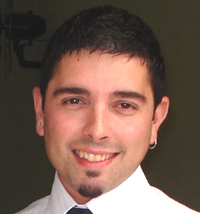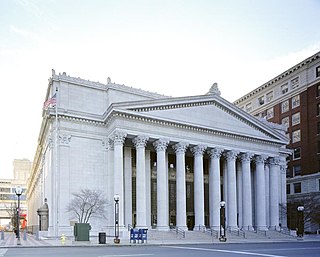An expert witness, particularly in common law countries such as the United Kingdom, Australia, and the United States, is a person whose opinion by virtue of education, training, certification, skills or experience, is accepted by the judge as an expert. The judge may consider the witness's specialized opinion about evidence or about facts before the court within the expert's area of expertise, to be referred to as an "expert opinion". Expert witnesses may also deliver "expert evidence" within the area of their expertise. Their testimony may be rebutted by testimony from other experts or by other evidence or facts.
Wiretapping, also known as wire tapping or telephone tapping, is the monitoring of telephone and Internet-based conversations by a third party, often by covert means. The wire tap received its name because, historically, the monitoring connection was an actual electrical tap on an analog telephone or telegraph line. Legal wiretapping by a government agency is also called lawful interception. Passive wiretapping monitors or records the traffic, while active wiretapping alters or otherwise affects it.

In the context of information security, social engineering is the psychological manipulation of people into performing actions or divulging confidential information. A type of confidence trick for the purpose of information gathering, fraud, or system access, it differs from a traditional "con" in the sense that it is often one of the many steps in a more complex fraud scheme. It has also been defined as "any act that influences a person to take an action that may or may not be in their best interests."

Flex Ltd. is an American multinational manufacturing company. It is the third largest global electronics manufacturing services (EMS), original design manufacturer (ODM) company by revenue, behind only Pegatron for what concerns original equipment manufacturers. Flex's U.S. corporate headquarters are located in Austin, Texas. The company has manufacturing operations in over 30 countries, totaling about 172,000 employees.

Forensic accounting, forensic accountancy or financial forensics is the specialty practice area of accounting that investigates whether firms engage in financial reporting misconduct, or financial misconduct within the workplace by employees, officers or directors of the organization. Forensic accountants apply a range of skills and methods to determine whether there has been financial misconduct by the firm or its employees.

Mark Abene is an American information security expert and entrepreneur, originally from New York City. Better known by his pseudonym Phiber Optik, he was once a member of the hacker groups Legion of Doom and Masters of Deception.

The Electronic Communications Privacy Act of 1986 (ECPA) was enacted by the United States Congress to extend restrictions on government wire taps of telephone calls to include transmissions of electronic data by computer, added new provisions prohibiting access to stored electronic communications, i.e., the Stored Communications Act, and added so-called pen trap provisions that permit the tracing of telephone communications . ECPA was an amendment to Title III of the Omnibus Crime Control and Safe Streets Act of 1968, which was primarily designed to prevent unauthorized government access to private electronic communications. The ECPA has been amended by the Communications Assistance for Law Enforcement Act (CALEA) of 1994, the USA PATRIOT Act (2001), the USA PATRIOT reauthorization acts (2006), and the FISA Amendments Act (2008).

The CSI effect describes the various ways in which the exaggerated portrayal of forensic science on crime television shows such as CSI: Crime Scene Investigation influences public perception. The term was first reported in a 2004 USA Today article describing the effect being made on trial jurors by television programs featuring forensic science.

Digital forensics is a branch of forensic science encompassing the recovery, investigation, examination, and analysis of material found in digital devices, often in relation to mobile devices and computer crime. The term "digital forensics" was originally used as a synonym for computer forensics but has expanded to cover investigation of all devices capable of storing digital data. With roots in the personal computing revolution of the late 1970s and early 1980s, the discipline evolved in a haphazard manner during the 1990s, and it was not until the early 21st century that national policies emerged.

Forensic facial reconstruction is the process of recreating the face of an individual from their skeletal remains through an amalgamation of artistry, anthropology, osteology, and anatomy. It is easily the most subjective—as well as one of the most controversial—techniques in the field of forensic anthropology. Despite this controversy, facial reconstruction has proved successful frequently enough that research and methodological developments continue to be advanced.
Anti–computer forensics or counter-forensics are techniques used to obstruct forensic analysis.

Computational criminology is an interdisciplinary field which uses computing science methods to formally define criminology concepts, improve our understanding of complex phenomena, and generate solutions for related problems.
Matthew E. Yarbrough is an American lawyer and a former Assistant United States Attorney for the North District of Texas, where he was the lead prosecutor in several notable alien smuggling, illegal immigration and cyber hacking cases. He is now the founder and Managing Partner of Yarbrough Blackstone Law in Dallas, Texas.
The Trojan horse defense is a technologically based take on the classic SODDI defense, believed to have surfaced in the UK in 2003. The defense typically involves defendant denial of responsibility for (i) the presence of cyber contraband on the defendant's computer system; or (ii) commission of a cybercrime via the defendant's computer, on the basis that a malware or on some other perpetrator using such malware, was responsible for the commission of the offence in question.

United States v. Ivanov was an American court case addressing subject-matter jurisdiction for computer crimes performed by Internet users outside of the United States against American businesses and infrastructure. In trial court, Aleksey Vladimirovich Ivanov of Chelyabinsk, Russia was indicted for conspiracy, computer fraud, extortion, and possession of illegal access devices; all crimes committed against the Online Information Bureau (OIB) whose business and infrastructure were based in Vernon, Connecticut.

Palo Alto Networks, Inc. is an American multinational cybersecurity company with headquarters in Santa Clara, California. The core product is a platform that includes advanced firewalls and cloud-based offerings that extend those firewalls to cover other aspects of security. The company serves over 70,000 organizations in over 150 countries, including 85 of the Fortune 100. It is home to the Unit 42 threat research team and hosts the Ignite cybersecurity conference. It is a partner organization of the World Economic Forum.
Stephen P. Heymann is an attorney who formerly served as an Assistant U.S. Attorney for the District of Massachusetts. He is no longer with the U.S. Attorney's office. He headed U.S. Attorney Carmen Ortiz's Internet and Computer Crimes Unit.
Digital Forensics Framework (DFF) is a discontinued computer forensics open-source software package. It is used by professionals and non-experts to collect, preserve and reveal digital evidence without compromising systems and data.

The Bangladesh Bank robbery, also known colloquially as the Bangladesh Bank cyber heist, was a theft that took place in February 2016. Thirty-five fraudulent instructions were issued by security hackers via the SWIFT network to illegally transfer close to US$1 billion from the Federal Reserve Bank of New York account belonging to Bangladesh Bank, the central bank of Bangladesh. Five of the thirty-five fraudulent instructions were successful in transferring US$101 million, with US$81 million traced to the Philippines and US$20 million to Sri Lanka. The Federal Reserve Bank of New York blocked the remaining thirty transactions, amounting to US$850 million, due to suspicions raised by a misspelled instruction. As of 2018, only around US$18 million of the US$81 million transferred to the Philippines has been recovered, and all the money transferred to Sri Lanka has since been recovered. Most of the money transferred to the Philippines went to four personal accounts, held by single individuals, and not to companies or corporations.
Eric Friedberg is an American lawyer and a former Assistant United States Attorney who specializes in the field of cybercrime, Intellectual Property and Securities Litigation practices.










